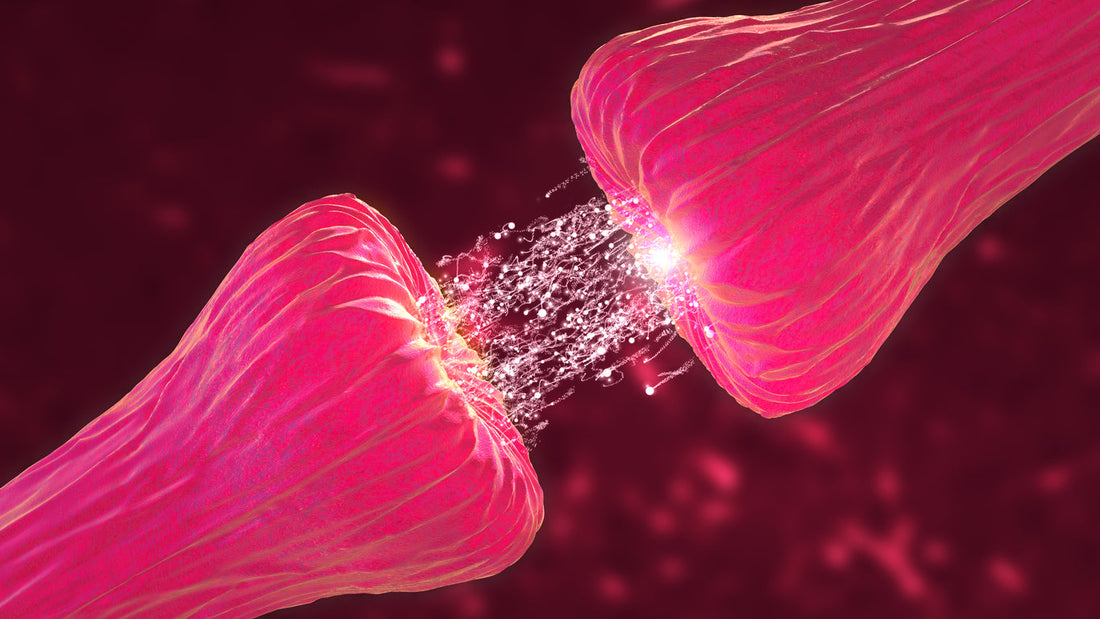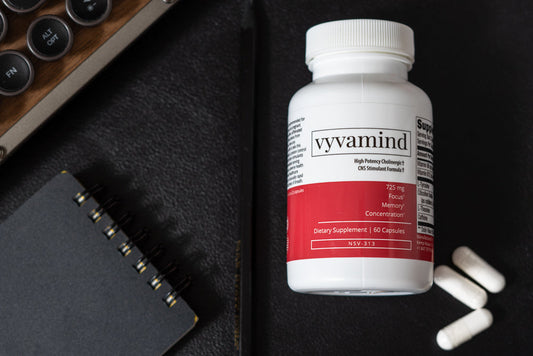Does Tyrosine Increase Dopamine?: A look at the scientific evidence

Ever found yourself reaching for that third cup of coffee, desperately searching for focus and motivation? You're not alone. While caffeine might be the go-to solution, there's growing interest in a more foundational approach: Tyrosine. This amino acid has caught the attention of everyone from students pulling all-nighters to athletes pushing their limits, and for good reason.
Think of Tyrosine as your brain's raw material for creating some of its most important chemicals. Your body naturally produces this amino acid, which then gets converted into three crucial neurotransmitters: dopamine, norepinephrine, and epinephrine. These aren't just fancy scientific terms – they're the very compounds that control how energetic, productive, and focused you feel. They also influence everything from your reaction speed to how efficiently your body burns fat.
What's particularly interesting about Tyrosine is its relationship with dopamine, your brain's motivation molecule. When dopamine levels drop, you might notice yourself feeling foggy, unmotivated, or just plain tired. This is where Tyrosine comes in. By providing your brain with more of the basic building blocks it needs, Tyrosine can help maintain healthy dopamine levels. This doesn't just affect your mood – it can improve your focus, athletic performance, and even how your body moves and coordinates itself. In the following sections, we'll break down exactly how Tyrosine works, what it can (and can't) do for you, and how to use it effectively for better mental and physical performance.
Mechanism of Action: What does Tyrosine do?
Let's cut through the complexity and understand exactly how Tyrosine works in your brain. At its core, Tyrosine is like a master key that unlocks your brain's ability to produce dopamine, the neurotransmitter that drives motivation, sharpens attention, and regulates everything from your movements to your mood.
The process is remarkably precise: Your brain transforms Tyrosine into a compound called L-DOPA through a specialized enzyme called tyrosine hydroxylase (TH). L-DOPA then undergoes another conversion, becoming dopamine through the action of a second enzyme, aromatic amino acid decarboxylase (AADC). This chemical choreography happens primarily in two key brain regions: the substantia nigra, which helps control your movements, and the ventral tegmental area, which manages your sense of reward and motivation.
Research backs up Tyrosine's effectiveness. Wurtman's team discovered that Tyrosine supplementation significantly boosted dopamine production in the prefrontal cortex – the brain's command center for working memory and attention. Similarly, Chalon's research revealed that Tyrosine increased dopamine release in the striatum, a brain region crucial for coordinating movement and processing reward signals.
The real-world impact of this process is substantial. When you take Tyrosine, you're essentially providing your brain with more raw material to produce dopamine. It's like increasing the capacity of a factory that's running low on supplies – give it more resources, and it can produce more of what you need. This boost in dopamine production can enhance your cognitive performance, particularly when your brain is under stress or needs to maintain focus for extended periods.

Benefits of Increased Dopamine Levels
Improved Motivation and Focus
Ever notice how some days you're firing on all cylinders while others feel like you're wading through fog? Dopamine levels often make the difference. When your brain has optimal dopamine levels, you'll find yourself naturally more driven and focused. Arnsten's research confirmed what many of us experience: proper dopamine levels can significantly boost your cognitive function and ability to stay on task, especially during challenging projects.
Increased Working Memory
Think of working memory as your brain's mental workspace - it's where you juggle information while solving problems or making decisions. Dopamine acts like a memory enhancer, helping you hold and manipulate information more effectively. Research by Cools and D'Esposito showed that balanced dopamine levels can sharpen your ability to process information, solve problems, and make quick, effective decisions.
Better Decision-Making Skills
Dopamine doesn't just make you feel good - it helps you make smarter choices. Fiorillo's research revealed that proper dopamine levels improve your ability to predict outcomes and adjust your behavior accordingly. This means better judgment in everything from daily decisions to long-term planning.
Enhanced Mood
Feeling stuck in a rut? Dopamine plays a crucial role in regulating your emotional state. Treadway's research demonstrated that healthy dopamine levels can lift your mood and help combat feelings of depression and anxiety. This isn't just about feeling happier - it's about maintaining emotional resilience throughout your day.
Better Motor Function
Beyond mental benefits, dopamine significantly impacts your physical performance. It's essential for smooth, coordinated movement - something Bridgman's research highlighted while studying conditions like Parkinson's disease. For healthy individuals, this means better coordination and more fluid movement in everything from sports to daily activities.
While these benefits sound impressive, remember that individual results can vary based on factors like dosage, overall health, and other medications. Before starting any supplement regimen, it's worth having a conversation with your healthcare provider to ensure it's right for your specific situation.
FAQs
How much tyrosine to raise dopamine?
Finding your optimal tyrosine dosage isn't one-size-fits-all, but research points to a sweet spot. Studies suggest taking 100-150 mg per kilogram of body weight for noticeable effects. For someone weighing 70 kg (154 lbs), this translates to 7-10.5 grams. Start with a lower dose and adjust based on your response.
Does N Acetyl L-tyrosine increase dopamine?
Yes, and it might work even better than regular tyrosine. N-Acetyl L-Tyrosine (NALT) is essentially tyrosine with a molecular upgrade that helps it enter your bloodstream more efficiently. Think of it as tyrosine's more sophisticated cousin - same family, better delivery system.
Which amino acids increase dopamine?
While tyrosine gets most of the attention, it's not working alone. Phenylalanine is another key player in the dopamine production line. Your body actually converts phenylalanine into tyrosine, which then becomes dopamine. It's like a molecular assembly line where each amino acid plays its part.
Does tyrosine turn into L-dopa?
Yes - tyrosine converts to L-DOPA as part of its journey to becoming dopamine. This isn't just a random change - it's a precise, step-by-step process your body uses to create the dopamine it needs. Tyrosine transforms into L-DOPA, which then becomes dopamine through specific enzymatic reactions in your brain.

Summary: Should you take Tyrosine to boost dopamine?
Looking for a natural way to sharpen your mental edge? Tyrosine deserves serious consideration. This amino acid isn't just another supplement – it's a fundamental building block your brain uses to create dopamine, powering everything from your motivation to your ability to stay focused under pressure.
What makes Tyrosine particularly interesting is its versatility. Whether you're cramming for an exam, pushing through a demanding work project, or need sustained mental clarity, Tyrosine can help maintain your cognitive performance when you need it most. It's especially effective when combined with other cognitive enhancers like caffeine, citicoline, and theanine – think of it as assembling your own personal productivity toolkit.
The best part? Tyrosine has a solid safety profile backed by human studies. Unlike some cognitive enhancers that come with a laundry list of side effects, Tyrosine works with your body's natural chemistry. It's not about artificially stimulating your brain – it's about giving your body the raw materials it needs to function at its best. If you're looking for a way to support your cognitive performance without compromising on safety, Tyrosine offers a practical, science-backed solution that fits naturally into your daily routine.
References
- Cools, Roshan, and Mark D'Esposito. “Inverted-U-shaped dopamine actions on human working memory and cognitive control.” Biological psychiatry vol. 69,12 (2011): e113-25. doi:10.1016/j.biopsych.2011.03.028
- Arnsten, Amy F T et al. “Dopamine's Actions in Primate Prefrontal Cortex: Challenges for Treating Cognitive Disorders.” Pharmacological reviews vol. 67,3 (2015): 681-96. doi:10.1124/pr.115.010512
-
Wurtman, Richard J et al. “Effects of normal meals rich in carbohydrates or proteins on plasma tryptophan and tyrosine ratios.” The American journal of clinical nutrition vol. 77,1 (2003): 128-32. doi:10.1093/ajcn/77.1.128





